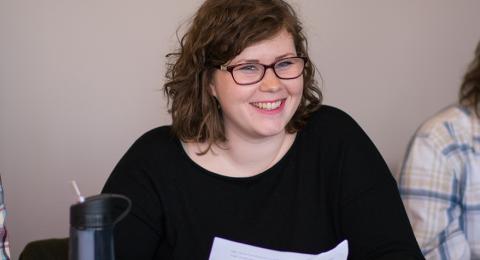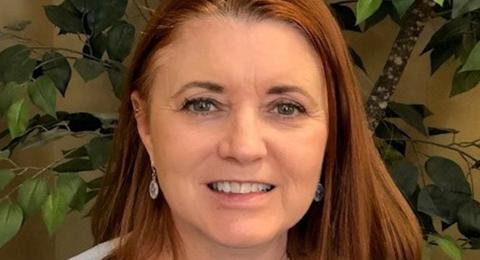The English Literature major at UNH focuses on studying literature in the English language, enhancing your skills in reading, interpreting, and understanding literary works, films, and cultural phenomena. The program covers artistic, historical, cultural, and theoretical contexts, making it ideal for students pursuing graduate studies in English or law school. With small class sizes, students work closely with faculty and explore various special programs, such as studying at Cambridge University and travel writing in London. The Writers and Speakers Series also connects students with prominent writers and scholars.
What is English literature?
program, you’ll become a skilled reader and interpreter of literary works, films, media creations and cultural phenomena. Understanding literature is multidimensional, and includes the consideration of the artistic, historical, cultural and theoretical contexts that inform imaginative creations. The literature major is especially well suited for students interested in graduate studies in English or law school, but it is also an excellent program for those who want to develop an in-depth knowledge of literature in English in all its formal, historical, cultural and theoretical dimensions.
Why study English literature at UNH?
closely with faculty while exploring English literature in depth. We also offer a variety of special programs, including opportunities abroad studying literature at Cambridge University and travel writing in London. In our Writers and Speakers Series, you’ll hear published writers and prominent literary scholars from around the country talk about their work.
Potential careers
- Business executive
- Critic
- Editor
- Government consultant
- Lawyer
- Professor
- Publisher
- Writer
Curriculum & Requirements
The English literature major serves those students who want to focus particularly on the study of literature — its many forms and styles, its rich history and the range of approaches to its analysis. The English literature track is an especially attractive major for those who plan to go on to graduate school.
As an English literature major, a student will learn about various literary traditions, both British and American literature as well as traditions organized around other principles, such as post-colonial literature, women's literature, African-American literature and genres like poetry and drama. Courses are designed to expose students to many different sorts of works and to help them develop questions and strategies of critical thinking that will make all kinds of literary expression meaningful. And the works students will study will provide many ways of looking at the world and enrich their quality of life. What's more, students have many opportunities to hone critical writing and research skills and to practice the art of presenting research findings to a group, all skills in high demand in today's workplace. The English literature major is an excellent way to combine development of interpretive and writing skills with an exciting, in-depth encounter with some of the very best writing ever produced in the English language.
Students interested in majoring in English literature should contact the Department of English, 230F Hamilton Smith Hall, (603) 862-1313 or the director of the English literature program.
Sample Degree Plan
This sample degree plan serves as a general guide; students collaborate with their academic advisor to develop a personalized degree plan to meet their academic goals and program requirements.
| First Year | ||
|---|---|---|
| Fall | Credits | |
| ENGL 401 | First-Year Writing 1 | 4 |
| Language Course | 4 | |
| Discovery Course | 4 | |
| Discovery Course or Major Course | 4 | |
| COLA 401A:First Year Seminar | 1 | |
| Credits | 17 | |
| Spring | ||
| ENGL 419 | How to Read Anything | 4 |
| Language Course | 4 | |
| Discovery Course | 4 | |
| Major/Minor/Discovery Course | 4 | |
| Credits | 16 | |
| Second Year | ||
| Fall | ||
| Major 500-Level Literature Survey | 4 | |
| Major Course 500/600-Level | 4 | |
| Discovery Course | 4 | |
| Major/Minor/Discovery Course | 4 | |
| Credits | 16 | |
| Spring | ||
| Major 500-Level Literature Survey | 4 | |
| Major Course 500/600-Level | 4 | |
| Discovery Course | 4 | |
| Major/Minor/Discovery Course | 4 | |
| Credits | 16 | |
| Third Year | ||
| Fall | ||
| ENGL 714 | Critical Skills | 4 |
| Major Course | 4 | |
| Discovery Course | 4 | |
| Major/Minor/Discovery Course | 4 | |
| Credits | 16 | |
| Spring | ||
| Major Course | 4 | |
| Major Course | 4 | |
| Discovery Course | 4 | |
| Major/Minor/Discovery Course | 4 | |
| Credits | 16 | |
| Fourth Year | ||
| Fall | ||
| ENGL 787 | English Major Seminar (Capstone or Major Elective) | 4 |
| Major Elective Course | 4 | |
| Elective Course | 4 | |
| Elective Course | 4 | |
| Credits | 16 | |
| Spring | ||
| ENGL 787 | English Major Seminar (Capstone or Major Elective) | 4 |
| Elective Course | 4 | |
| Elective Course | 4 | |
| Elective Course | 4 | |
| Credits | 16 | |
| Total Credits | 129 | |
- 1
Students who successfully apply AP or Transfer Credits towards the ENGL 401 ‘First Year Writing’ requirement may enroll in ENGL 419 during their first semester.
Degree Requirements
All Major, Option and Elective Requirements as indicated.
*Major GPA requirements as indicated.
Major Requirements
- The required minimum overall GPA in major coursework is 2.0.
- English Literature majors may use one major-required course to satisfy one Discovery category requirement.
- Majors may only count one online course toward their English major requirements.
- English literature majors complete a minimum of 40 credits of major coursework with a grade of C- or better.
- ENGL 401, ENGL 415, or ENGL 444 may not be used to satisfy major requirements.
- A minimum of six courses must be completed at the 600-level or higher.
| Code | Title | Credits |
|---|---|---|
| Required Courses | ||
| Coursework must meet the following distribution requirements (a single course may satisfy multiple requirements): | ||
ENGL 419 | How to Read Anything 1 | |
Select two 500-level literature courses (see list below) | ||
Select two Pre-1800 Literature courses (see list below) | ||
Select two Post-1800 Literature courses (see list below) | ||
ENGL 714 | Critical Skills | |
Select one American literature course at the 600/700 level | ||
Select one British literature course at the 600/700 level | ||
Select one course that studies Community and Cultures in a U.S. context (see list below) | ||
Select one course that investigates Anglophone literature in a global or transnational context (see list below) | ||
Select one course in a specific genre including, poetry, memoir, nonfiction, drama, fiction, and film (see list below) 2 | ||
| Capstone: | ||
ENGL 787 | English Major Seminar | |
- 1
Must be completed with a minimum grade of C.
ENGL 419 is the only 400-level course that may count towards major requirements.- 2
With the exception of ENGL 533 Introduction to Film Studies.
| Code | Title | Credits |
|---|---|---|
| 500-level Courses | ||
| Select from the following: | ||
ENGL/LING 405 | Introduction to Linguistics | |
ENGL 501 | Introduction to Creative Nonfiction | |
ENGL 502 | Professional and Technical Writing | |
ENGL 503 | Persuasive Writing | |
ENGL 510 | Introduction to the Digital Humanities | |
ENGL 512 | British Literature I Age of Heroes: Beowulf to Dr. Faustus | |
ENGL 513W | British Literature II Age of Revolutions: Shakespeare to Austen | |
ENGL 514W | British Literature III: Revolts, Renewals, Migrations | |
ENGL 516W | American Literature II Money, Migration, and Modernity: Huck Finn to Beloved | |
ENGL 518W | Bible as Literature | |
ENGL 520 | Dystopian and Post-Apocalyptic Fiction | |
ENGL 526 | Introduction to Fiction Writing | |
ENGL 527 | Introduction to Poetry Writing | |
ENGL 533 | Introduction to Film Studies | |
ENGL 534 | 21st Century Journalism: How the News Works | |
ENGL 550 | Introduction to the Literature and Culture of Race | |
ENGL 555 | Science Fiction | |
ENGL 575 | Sex and Sensibility: The Rise of Chick Lit | |
ENGL 581 | Reading the Postcolonial Experience | |
ENGL 585 | Introduction to Women in Literature | |
ENGL 595 | Literary Topics | |
| Code | Title | Credits |
|---|---|---|
| Pre-1800 Literature Courses | ||
| Select from the following: | ||
ENGL 512 | British Literature I Age of Heroes: Beowulf to Dr. Faustus | |
or ENGL 513W | British Literature II Age of Revolutions: Shakespeare to Austen | |
ENGL 595 | Literary Topics (if topic is appropriate) | |
ENGL 657 | Shakespeare | |
ENGL 693R | Special Topics in Literature (if topic is appropriate) | |
ENGL 751 | Medieval Romance | |
ENGL 756 | Chaucer | |
ENGL 758 | Advanced Shakespeare | |
ENGL 759 | Milton | |
ENGL 787 | English Major Seminar (if topic is appropriate) | |
| Code | Title | Credits |
|---|---|---|
| Post-1800 Literature Courses | ||
| Select from the following: | ||
ENGL 514W | British Literature III: Revolts, Renewals, Migrations | |
or ENGL 516W | American Literature II Money, Migration, and Modernity: Huck Finn to Beloved | |
ENGL 595 | Literary Topics (if topic is appropriate) | |
ENGL 690 | African American Literature | |
ENGL 693R | Special Topics in Literature (if topic is appropriate) | |
ENGL 738 | Asian American Studies | |
ENGL 775 | Modern Irish Literature: A Changing Landscape | |
ENGL 777 | The English Novel in the World | |
ENGL 782 | Modern and Contemporary Drama | |
ENGL 784 | English Novel of the 19th Century | |
ENGL 787 | English Major Seminar (if topic is appropriate) | |
ENGL 797R | Special Studies in Literature (Race & Racial Theories) (if topic is appropriate) | |
| Code | Title | Credits |
|---|---|---|
| Community and Cultures in the U.S. | ||
| Select from the following: | ||
ENGL 440A | Honors/On Race in Culture and Society | |
ENGL 550 | Introduction to the Literature and Culture of Race | |
ENGL 650R | I Hear America Singing: Studying American Literature and Culture | |
ENGL 690 | African American Literature | |
ENGL 693 | Special Topics in Literature (subtopic R) | |
ENGL 693R | Special Topics in Literature | |
ENGL 738 | Asian American Studies | |
ENGL 778 | Race and Gender in Film and Popular Culture | |
ENGL 797R | Special Studies in Literature (Race & Racial Theories) | |
| Code | Title | Credits |
|---|---|---|
| Courses that Investigate Anglophone Literature in Global or Transnational Contexts | ||
| Select from the following: | ||
ENGL 581 | Reading the Postcolonial Experience | |
ENGL 773 | Literary Modernisms: Return, Revolt, Recycle | |
ENGL 775 | Modern Irish Literature: A Changing Landscape | |
ENGL 777 | The English Novel in the World | |
| Code | Title | Credits |
|---|---|---|
| Courses in a specific genre including poetry, memoir, nonfiction, drama, fiction, and film 2 | ||
| Select from the following: | ||
ENGL 520 | Dystopian and Post-Apocalyptic Fiction | |
ENGL 555 | Science Fiction | |
ENGL 575 | Sex and Sensibility: The Rise of Chick Lit | |
ENGL 616A | Studies in Film/Genre | |
ENGL 616B | Studies in Film/Authorship | |
ENGL 616C | Studies in Film/Culture and Ideology | |
ENGL 616D | Studies in Film/Narrative and Style | |
ENGL 618 | Film Theory | |
ENGL 693R | Special Topics in Literature (if topic is appropriate) | |
ENGL 778 | Race and Gender in Film and Popular Culture | |
ENGL 797R | Special Studies in Literature (Race & Racial Theories) | |
Please see your advisor if you have questions about other courses that might fulfill these requirements.
Program Learning Outcomes
All undergraduate English majors acquire the same core skills. These include:
- Proficiency in analytical writing, critical thinking, and public-speaking.
- Knowledge of important literary genres and subgenres
- Fluency in literary terminology,
- A broad understanding of British-and-American literature, from the medieval period in England and the moment of first contact in America to the present day.
- Demonstrated proficiency in writing an analytical essay that offers a sophisticated close-reading or explication of a literary text. This essay will have a clear thesis and proceed in a logical fashion, with interpretive claims supported by evidence from the text.
- Demonstrated proficiency in literary research and in writing an extended thesis-driven research paper in which sources are correctly and responsibly cited.
- Demonstrated understanding of how to read across the color line in the US and /or how to analyze literary works written in English from outside the UK and the US--from India, Africa, and the Caribbean, for example.
Explore Program Details
Reading literature encourages the mind to enter new, and sometimes improbable, spheres of experience. Some literary texts inspire us to feel admiration and compassion for unlikely heroes or heroines: a son overwhelmed by the sudden death of his father and his mother's quick remarriage to his despicable uncle, a woman who loses her social standing and whose subsequent humiliation and poverty drive her to suicide, a wife trapped in a loveless marriage, or a daughter who accidentally encounters her birth parents. Others confront us with perplexing concepts: the "ineluctable modality of the visible," "fearful symmetry," and that it can "be very, very dangerous to live even one day." Still others ask us to consider the wondrous properties of the very, very small (a grain of sand, leaves of grass) or the very, very large (a white whale, the Congo); or to observe the world from a multitude of perspectives, from above or below, earlier or later, male or female, east or west, black or white, all at the same time. Literature, too, grants access to scenes or sights that can be neither diagrammed nor charted nor otherwise pictured. How are two lovers like a pair of compasses? How is life like a loaded gun, or love without hope like a hat full of larks? Magnificent new microscopes and telescopes have brought human beings, standing somewhere between the stars and sub-atomic particles, a little closer to both. Literature transports the cosmos into our most private and personal reflections; yet it also shows us how everyday things, the objects and scenery we hardly notice as we trudge through our routines, can be made radiant with a strange beauty. "Poetry," a poet wrote, "purges from our inward sight the film of familiarity which obscures from us the wonder of our being." Literature is not a physical instrument; it is a purely intellectual one. But, like an unfamiliar piece of computer technology, we need to learn how to use it—or we will be left behind; our lives will be seriously diminished. How literature works is what the English major can teach you.
Rachel Trubowitz and Michael Ferber
Professors of English, University of New Hampshire






